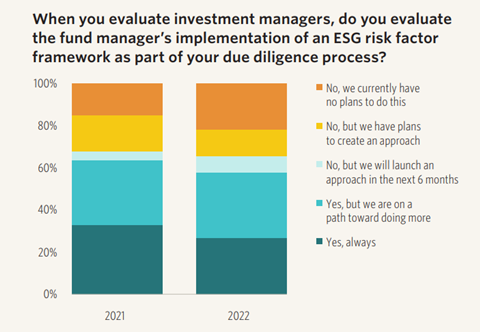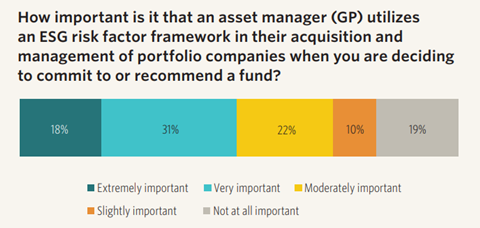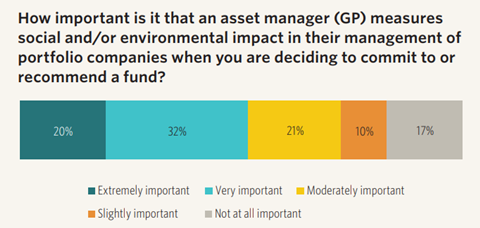By Daram Pandian, Associate, Private Equity & Venture Capital, and Peter Dunbar, Head of Private Equity, PRI


According to investment consultant Cambridge Associates, an index composed of 2233 US venture capital funds returned 32% (net of management and performance fees) in the 25 years to March 2022.
The NASDAQ Composite index, which tracks the performance of the largest tech firms listed in the US, delivered 12% over the same period.
Clearly, venture capital returns from the most successful firms can be phenomenal. So much so that during our research for a discussion paper on responsible investment in venture capital, we heard anecdotally that some limited partners (LPs) are afraid to engage general partners (GPs) on commercial and ESG issues at the risk of being blocked from receiving an allocation to a fund.
This must not be allowed to continue. Scandals at companies that were originally backed by venture capital – such as Uber, WeWork and Theranos – reiterate why comprehensive GP-portfolio company and LP-GP ESG due diligence at the pre-investment stage, and active monitoring and management of ESG risks post-investment, are crucial.
This is especially the case considering that the most socially and environmentally impactful companies in the decades to come – those developing technological solutions to challenges in climate, health, and finance – are likely to be heavily venture-backed.
Climate tech for instance, attracted US$37 billion in venture capital funding in 2021 alone, according to Holon IQ, including 61 mega rounds of over US$100 million, creating 28 new unicorns. However, virtually none of the largest and best-known GPs in the venture capital industry are PRI signatories yet.
GPs must adopt responsible practices
Since venture capital GPs are the initial gatekeepers of institutional capital for new companies, in theory, they should be able to set them on a responsible pathway as they begin to scale. And as they are at the top of the investment chain, LPs have an important role to play in ensuring this happens.
A recent global survey by Pitchbook of 418 private markets LPs indicates that more than 50% already evaluate how GPs implement an ESG risk factor framework as part of their due diligence and a further 30% are planning to doing so.

These figures are promising, despite the slight drop between 2021 and 2022, which Pitchbook notes is due to the “politicisation of ESG and sustainable investing this year”. However, we suspect that most ESG due diligence on venture capital funds, where it does happen, remains light touch.
To help with this, we have launched a due diligence questionnaire – it is the first publicly available DDQ of its kind for asset owners and fund-of-funds to evaluate the responsible investment capabilities of venture capital GPs.
This is the culmination of six months of collaboration with a working group of 37 venture capital GPs and LPs from the US, Europe, and Asia.
The DDQ has been carefully adapted from our private equity DDQ – which forms part of ILPA’s broader private equity DDQ and gets used as standard during private equity fundraising – to reflect the nuances of venture capital and the fact that responsible investment practices largely remain nascent amongst GPs.
The questions are designed to be flexible enough for GPs that invest in earlier-stage companies and may themselves be at an earlier stage of their responsible investment journey to demonstrate progress, while also allowing later-stage investors and more advanced GPs to effectively communicate their practices to LPs.
Why should LPs use this DDQ?
It is imperative that the global LP community adopts our new DDQ and uses it as a core part of its due diligence on venture capital funds, making it a starting point that enables open dialogue with GPs.
If LPs do so, it can contribute to standardising due diligence practices and will reduce the administrative burden on GPs. It will also help normalise ESG due diligence in venture capital, which in turn will help alleviate LP fears around engagement and being left out of fundraising.
Venture capital firms must accept that times are changing. In its survey, Pitchbook found that when deciding to commit to or recommend a fund, roughly 50% of private markets LPs think it “extremely” or “very” important that GPs use an ESG framework in their acquisition and management of portfolio companies and that GPs measure social and/or environmental impact in their management of portfolio companies.


Some good practices are already developing
Indeed, some venture capital firms have already begun to take responsible investment seriously, as we found in the series of case studies released earlier this year on ESG incorporation and investing for sustainability outcomes. For example:
- Fin Capital uses 10 ESG criteria during due diligence that feed into its final investment decisions. It looks for companies to have a corporate code of ethics, assign ESG responsibility to a member of the management team, and to estimate their carbon footprints.
- The Westly Group has created a DEI term sheet clause which sets the expectation that portfolio companies must implement recruitment processes that reach underrepresented groups.
- MPower Partners provides portfolio companies with hands-on support post-investment to create an ESG roadmap, which includes issuing a start-up ESG playbook, proposing monthly actions, and participating in ESG team meetings.
We applaud these efforts. However, we see very little evidence that the largest venture capital firms in the industry are doing anything substantive to work towards incorporating ESG factors into their investment practices.
This needs to change. Pragmatic and stage-appropriate ESG incorporation needs to become a mainstream part of the venture capital industry, and LPs and GPs must work together to make this happen. We will support signatories to play their part – our dedicated DDQ is part of a broader work programme to do just that.
The PRI blog aims to contribute to the debate around topical responsible investment issues. It is written by PRI staff members and occasionally guest contributors. Blog authors write in their individual capacity – posts do not necessarily represent a PRI view.












